unit10导学案
- 格式:doc
- 大小:80.00 KB
- 文档页数:6
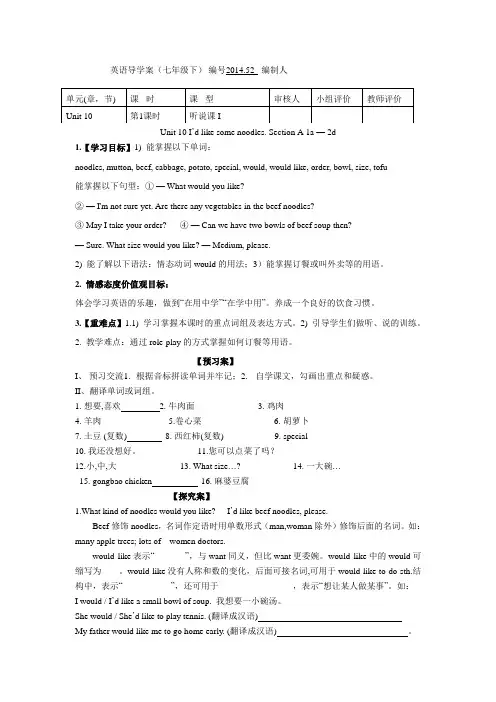
英语导学案(七年级下)编号2014.52 编制人1.【学习目标】1) 能掌握以下单词:noodles, mutton, beef, cabbage, potato, special, would, would like, order, bowl, size, tofu能掌握以下句型:①— What would you like?②— I'm not sure yet. Are there any vegetables in the beef noodles?③ May I take your order? ④— Can we have two bowls of beef soup then?— Sure. What size would you like? — Medium, please.2) 能了解以下语法:情态动词would的用法;3)能掌握订餐或叫外卖等的用语。
2. 情感态度价值观目标:体会学习英语的乐趣,做到“在用中学”“在学中用”。
养成一个良好的饮食习惯。
3.【重难点】1.1) 学习掌握本课时的重点词组及表达方式。
2) 引导学生们做听、说的训练。
2. 教学难点:通过role-play的方式掌握如何订餐等用语。
【预习案】I、预习交流1. 根据音标拼读单词并牢记;2. 自学课文,勾画出重点和疑惑。
II、翻译单词或词组。
1. 想要,喜欢2. 牛肉面______________3. 鸡肉__________________4. 羊肉 ____________5.卷心菜____________6. 胡萝卜________________7. 土豆 (复数) 8. 西红柿(复数) _________ 9. special _________10. 我还没想好。
_____________11.您可以点菜了吗?_________________12.小,中,大 _____________ 13. What size…? ___________ 14. 一大碗…______________15. gongbao chicken 16. 麻婆豆腐___________________【探究案】1.What kind of noodles would you like?----I’d like beef noodles, please.Beef修饰noodles,名词作定语时用单数形式(man,woman除外)修饰后面的名词。
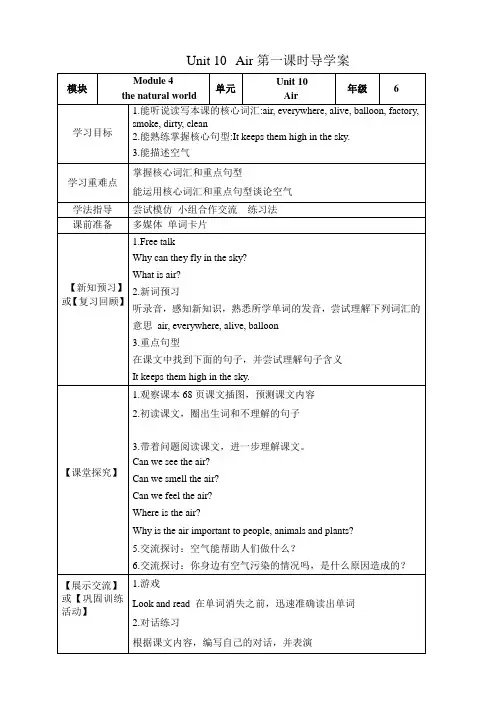
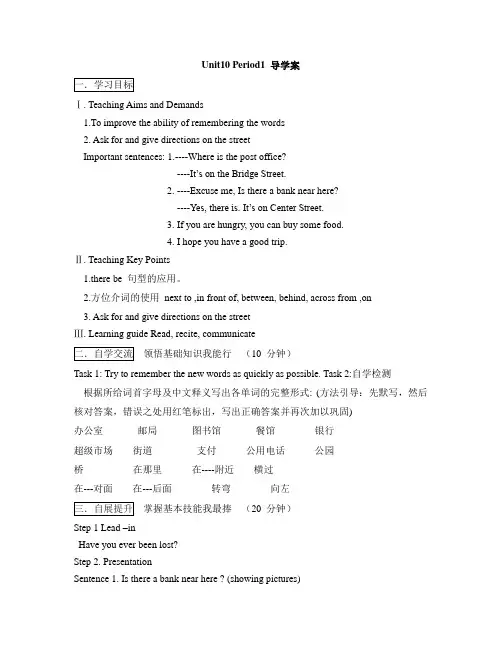
Unit10 Period1 导学案Ⅰ. Teaching Aims and Demands1.To improve the ability of remembering the words2. Ask for and give directions on the streetImportant sentences: 1.----Where is the post office?----It’s on the Bridge Street.2. ----Excuse me, Is there a bank near here?----Yes, there is. It’s on Center Street.3. If you are hungry, you can buy some food.4. I hope you have a good trip.Ⅱ. Teaching Key Points1.there be 句型的应用。
2.方位介词的使用next to ,in front of, between, behind, across from ,on3. Ask for and give directions on the streetⅢ. Learning guide Read, recite, communicate领悟基础知识我能行(10 分钟)Task 1: Try to remember the new words as quickly as possible. Task 2:自学检测根据所给词首字母及中文释义写出各单词的完整形式: (方法引导:先默写,然后核对答案,错误之处用红笔标出,写出正确答案并再次加以巩固)办公室____ 邮局____ 图书馆____ 餐馆____ 银行____超级市场____街道____ 支付____ 公用电话____ 公园____桥____ 在那里____ 在----附近____横过____在---对面____在---后面____ 转弯____ 向左____掌握基本技能我最捧(20 分钟)Step 1 Lead –inHave you ever been lost?Step 2. PresentationSentence 1. Is there a bank near here ? (showing pictures)---It’s on Center Street.Step 3 1a match the words with the places in the picture.Check the answers.Step4. Listening 1b.Step 5 Practice in pairsStep6 Presentation Sentence 2. The pay phone is across from the library.Step 7. Listening 2b. Listen and fill in the blanks with the words in the box.Step 8. Drills in pairs /in groups/ in class.掌握基本技能我最棒(15分钟)一.重点单词1.pay v. 付钱;支付;花费。
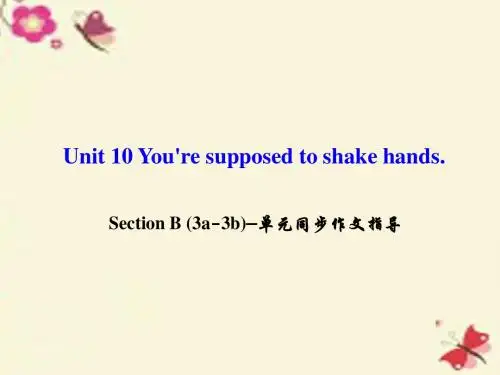
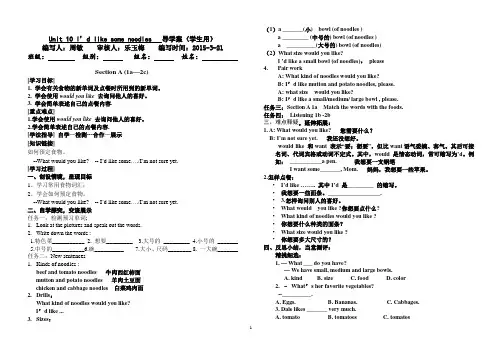
Unit 10 I’d like some noodles 导学案(学生用)编写人:周敏审核人:乐玉梅编写时间:2015-3-21 班级:组别:组名:姓名:Section A (1a—2c)[学习目标]1. 学会有关食物的新单词及点餐时所用到的新单词。
2. 学会使用would you like去询问他人的喜好。
3. 学会简单表述自己的点餐内容.[重点难点]1.学会使用would you like去询问他人的喜好。
2.学会简单表述自己的点餐内容.[学法指导] 自学—检测---合作—展示[知识链接]如何预定食物。
--What would you like? -- I’d like some…./I’m not sure yet.[学习过程]一、创设情境,呈现目标1、学习常用食物词汇;2、学会如何预定食物。
--What would you like? -- I’d like some…./I’m not sure yet.二、自学探究,交流展示任务一:检测预习单词;1.Look at the pictures and speak out the words.2.Write down the words :1.特色菜___________2. 想要_________3.大号的_________4.小号的_______5.中号的___________6.碗__________7.大小、尺码________8. 一大碗_______ 任务二:New sentences1.Kinds of noodles :beef and tomato noodles 牛肉西红柿面mutton and potato noodles 羊肉土豆面chicken and cabbage noodles 白菜鸡肉面2.Drills:What kind of noodles would you like?I’d like ...3.Sizes:(1)a _______(小) bowl (of noodles )a _________ (中号的) bowl (of noodles )a __________(大号的) bowl (of noodles)(2)What size would you like?I ’d like a small bowl (of noodles),please4.Pair workA: What kind of noodles would you like?B: I’d like mutton and potato noodles, please.A: what size would you like?B: I’d like a small/medium/ large bowl , please.任务三:Section A 1a Match the words with the foods.任务四:Listening 1b -2b三、难点释疑,延伸拓展:1. A: What would you like? 您需要什么?B: I’m not sure yet. 我还没想好。
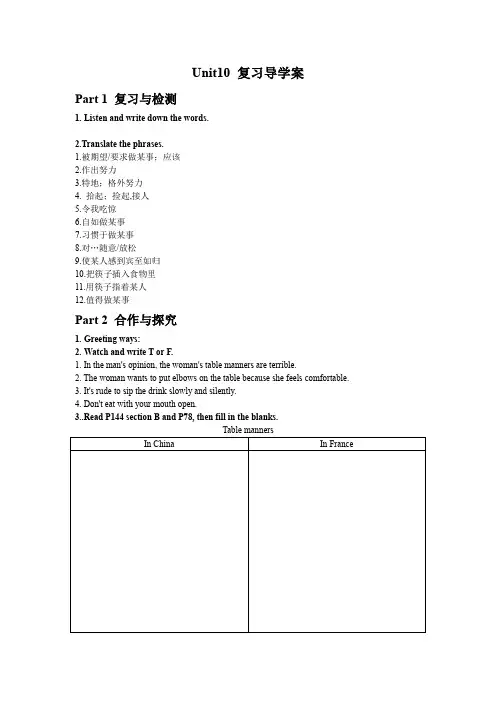
Unit10 复习导学案Part 1 复习与检测1.Listen and write down the words.2.Translate the phrases.1.被期望/要求做某事;应该2.作出努力3.特地;格外努力4. 拾起;捡起,接人5.令我吃惊6.自如做某事7.习惯于做某事8.对…随意/放松9.使某人感到宾至如归10.把筷子插入食物里11.用筷子指着某人12.值得做某事Part 2 合作与探究1.Greeting ways:2.Watch and write T or F.1. In the man's opinion, the woman's table manners are terrible.2. The woman wants to put elbows on the table because she feels comfortable.3. It's rude to sip the drink slowly and silently.4. Don't eat with your mouth open.3..Read P144 section B and P78, then fill in the blanks.Table mannersIn China In FrancePart 3 能力与提升1.Say sth to yourself or others.2.Read and choose the best answers.Some British and American people like to invite friends for a meal at home. You should not be upset if your English friends don't invite you home. It doesn't mean they don't like you.Dinner parties usually start between 7 and 8 p.m. and end at about 11. Ask your hosts what time you should arrive. It's polite to bring flowers, chocolates or a bottle of wine as a gift.Usually the evening starts with drinks and snacks. If you want to be extra polite, say how much you like the room, or the pictures on the wall. But remember—it's not polite to ask how much things cost.You'll probably start the meal with soup or something small, then you'll have meat or fish with vegetables, and then dessert, followed by coffee. It's polite to finish everything on your plate and to take more if you want it.Did you enjoy the evening? Call your hosts the next day, or write them a short “thank you”letter. British and American people like to say “thank you, thank you, thank you”all the time!1. If your English friend doesn't invite you to dinner at home, it means he or she______ . A.doesn't like you B.likes you C.is too busy2.It's impolite_________.A.to ask about the price of a certain thingB.to say “thank you”to hostsC.take nothing with you when you are invited to dinner3.The meal ends with_________usually.A.soupB.coffeeC.meat or fish4.When you are invited to a dinner party, you'd better_________ .A.ask what time you should arriveB.take your wife with youC.drink as more as possible3.Homework.Write a letter to your pen pal to give him/her advice and suggestions on how to behave properly in China.有关文化礼仪的写作常用句型You’re (not) supposed to….You are expected to…It’s polite/impolite to…It’s important to…You should….。
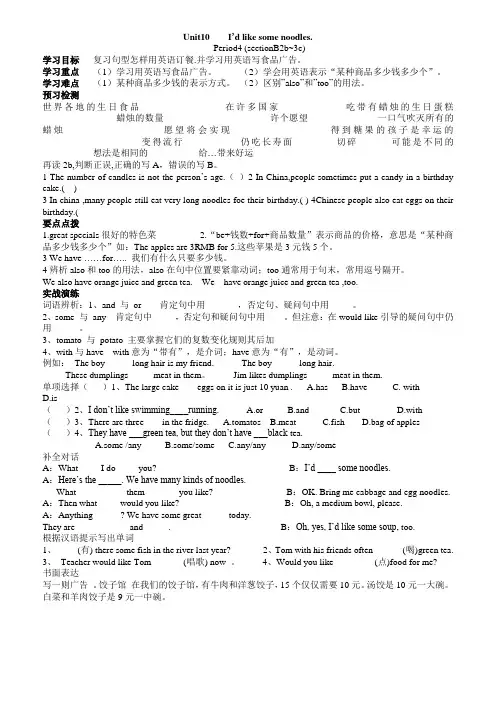
Unit10 I’d like some noodles.Period4 (sectionB2b~3c)学习目标复习句型怎样用英语订餐.并学习用英语写食品广告。
学习重点(1)学习用英语写食品广告。
(2)学会用英语表示“某种商品多少钱多少个”。
学习难点(1)某种商品多少钱的表示方式。
(2)区别”also”和”too”的用法。
预习检测世界各地的生日食品_________________ 在许多国家_____________ 吃带有蜡烛的生日蛋糕________________蜡烛的数量______________________ 许个愿望______________ 一口气吹灭所有的蜡烛____________________ 愿望将会实现____________________ 得到糖果的孩子是幸运的___________________ 变得流行___________ 仍吃长寿面________ 切碎______ 可能是不同的__________ 想法是相同的__________ 给…带来好运_________再读2b,判断正误,正确的写A,错误的写B。
1 The number of candles is not the person’s age.()2 In China,people sometimes put a candy in a birthday cake.( )3 In china ,many people still eat very long noodles foe their birthday.( ) 4Chinese people also eat eggs on their birthday.(要点点拨1.great specials很好的特色菜2.“be+钱数+for+商品数量”表示商品的价格,意思是“某种商品多少钱多少个”如:The apples are 3RMB for 5.这些苹果是3元钱5个。
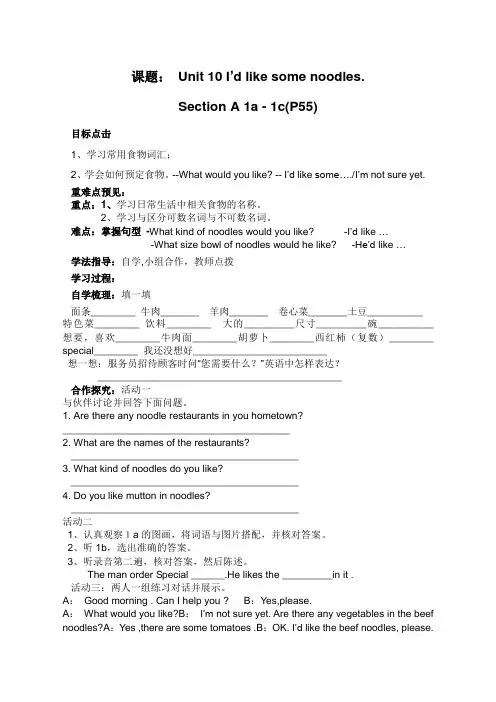
课题:Unit 10 I’d like some noodles.Section A 1a - 1c(P55)目标点击1、学习常用食物词汇;2、学会如何预定食物。
--What would you like? -- I’d like some…./I’m not sure yet.重难点预见:重点:1、学习日常生活中相关食物的名称。
2、学习与区分可数名词与不可数名词。
难点:掌握句型-What kind of noodles would you like? -I’d like …-What size bowl of noodles would he like? -He’d like …学法指导:自学,小组合作,教师点拨学习过程:自学梳理:填一填面条________ 牛肉_______ 羊肉_______ 卷心菜_______土豆__________ 特色菜________ 饮料________ 大的_________尺寸_________碗__________ 想要,喜欢________牛肉面________胡萝卜________西红柿(复数)________ special________ 我还没想好________________________想一想:服务员招待顾客时问“您需要什么?”英语中怎样表达?____________________________________________合作探究:活动一与伙伴讨论并回答下面问题。
1. Are there any noodle restaurants in you hometown?_________________________________________2. What are the names of the restaurants?_________________________________________3. What kind of noodles do you like?_________________________________________4. Do you like mutton in noodles?_________________________________________活动二1、认真观察1a的图画,将词语与图片搭配,并核对答案。
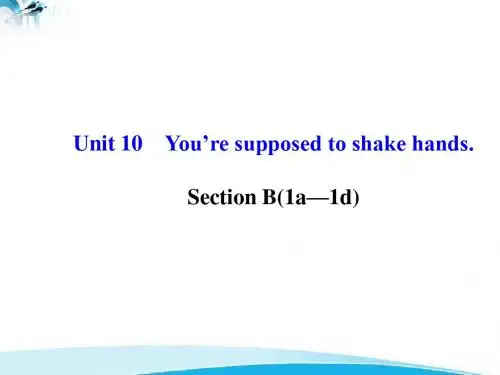
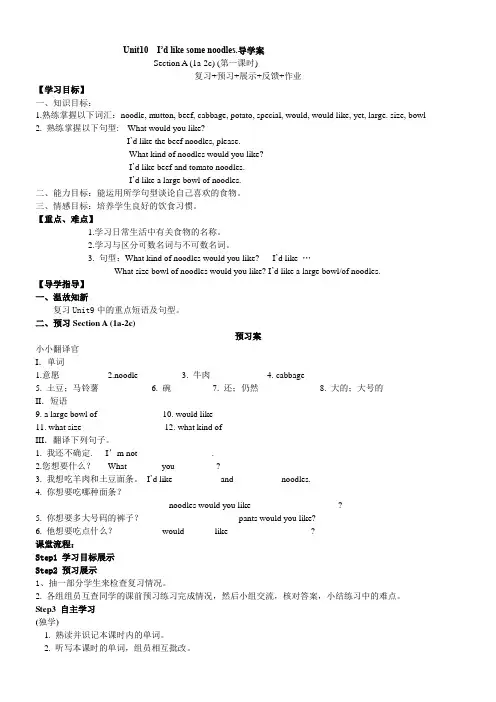
Unit10 I’d like some noodles.导学案Section A (1a-2c) (第一课时)复习+预习+展示+反馈+作业【学习目标】一、知识目标:1.熟练掌握以下词汇:noodle, mutton, beef, cabbage, potato, special, would, would like, yet, large. size, bowl2. 熟练掌握以下句型:---What would you like?---I’d like the beef noodles, please.--- What kind of noodles would you like?--- I’d like beef and tomato noodles.--- I’d like a large bowl of noodles.二、能力目标:能运用所学句型谈论自己喜欢的食物。
三、情感目标:培养学生良好的饮食习惯。
【重点、难点】1.学习日常生活中有关食物的名称。
2.学习与区分可数名词与不可数名词。
3. 句型:What kind of noodles would you like? I’d like…What size bowl of noodles would you like? I’d like a large bowl/of noodles.【导学指导】一、温故知新复习Unit9中的重点短语及句型。
二、预习Section A (1a-2c)预习案小小翻译官I.单词1.意愿________2.noodle________3. 牛肉________4. cabbage_________5. 土豆;马铃薯_________6. 碗_________7. 还;仍然__________8. 大的;大号的_________ II.短语9. a large bowl of ______________ 10. would like____________11. what size___________ 12. what kind of ____________________III.翻译下列句子。
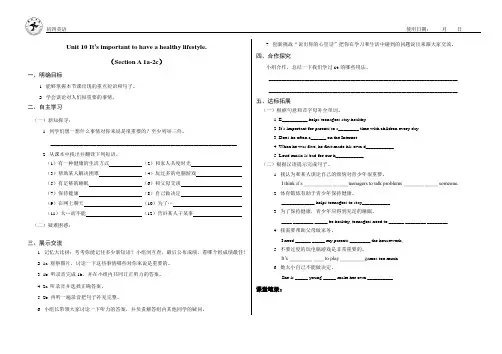
Unit 10 It’s important to have a healthy lifestyle.(Section A 1a-2c)一、明确目标1. 能够掌握本节课出现的重点短语和句子。
2. 学会谈论对人们很重要的事情。
二、自主学习(一)新知探寻:1. 同学们想一想什么事情对你来说是很重要的?至少列举三件。
_________________________________________________________________________2. 从课本中找出并翻译下列短语。
(1)有一种健康的生活方式(2)和家人共度时光(3)帮助某人解决困难(4)玩过多的电脑游戏(5)有足够的睡眠(6)和父母交谈(7)保持健康(8)自己做决定(9)在网上聊天(10)为了…(11)太…而不能(12)告诉某人干某事(二)疑难困惑:三、展示交流1. 记忆大比拼:考考你能记住多少新短语?小组间互查,最后公布成绩,看哪个组成绩最佳!2. 1a 观察图片,讨论一下这些事情哪些对你来说是重要的。
3. 1b 听录音完成1b,并在小组内共同订正听力的答案。
4. 2a 听录音并选择正确答案。
5. 2b 再听一遍录音把句子补充完整。
6. 小组长带领大家讨论一下听力的答案,并负责解答组内其他同学的疑问。
7. 创新挑战“说出你的心里话”把你在学习和生活中碰到的问题说出来跟大家交流。
四、合作探究小组合作,总结一下我们学过it的哪些用法。
__________________________________________________________________________ __________________________________________________________________________五、达标拓展(一)根据句意和首字母补全单词。
1. E__________ helps teenagers stay healthy.2. It’s important for parents to s________ time with children every day.3. Does he often c______ on the Internet.4. When he was five, he first made his own d___________.5. Loud music is bad for our h___________.(二)根据汉语提示完成句子。
Unit 10 If you go to the party, you’ll have a great time! The First Period Section A (1a–1c) Teaching aims(教学目标) 1. 掌握if + will (主将出现)的句式。 2. 能使用if + will谈论因果关系。 3. 学会合理的安排事情。 4. 思考自己的梦想并为之努力。 Language points(语言点) 1.要求掌握以下词汇:jeans,wear,famous,usual,wear jeans, take the bus to, have a great time, be sorry, be late, stay at home, give up (本节课的生词较少,而且单词的拼写比较简单,所以学生学起来不会感到困难,能够鼓励学生当堂掌握。) 2. 要求掌握以下句式: I think I'll wear jeans to the party. If you do, the teachers won't let you in. Are you going to the party tomorrow night? Who will you go with? What’s your dream? My dream is to be a reporter. Difficulties(难点):掌握if+will(主将出现)的句式 Teaching steps(教学步骤) 1. Warm-up and revision(课堂热身) Brainstorm and talk about parties, e.g., types of parties, when to have them, whom to invite, what to bring, food and drinks, types of music, games/activities. 2. Presentation(表现if+will(主将出现)的句式) (1) Ask and answer T: What will you do if it rains tomorrow/your friend is late/you lose your watch/your teacher gives you more homework? S: I will… if it rains tomorrow/my friend is late/I lose my watch/my teacher gives me more homework . (教师从前面的歌曲自然导入目标句型,让学生自然地根据提示熟悉并应用句型) (2) Find rules T: What will you do if it rains tomorrow/your friend is late/you lose your watch/your teacher gives you more homework S: I will call him/her if my friend is late. 主句 从句 (教师结合前面的歌曲,自然问答后引入关键句型。) T: If 引导的条状语从句中,当主句_________________时,从句用_____________, if 解释为“_____________”这就是 主将从现规律。 (教师引导学生总结规律,并简化要点,协助学生从练习中提炼要点,并回到练习当中去。) 3. Work on 1a (1) Lead in by asking and answering. T: Write these words in the blanks in the picture above. (教师能够四处走动,以协助学生将动词准确搭配在相关词组中,也能够让学生发挥peer assessment的作用) 4. Work on 1b 5. Work on 1b (1) Listen and complete the responses in 1a. T: Read the sentence in pairs together. (此处听力部分的内容,同时也是本课时目标语言的集中体现,所以,在完成后,教师能够带领学生朗读巩固。) 2
(2) Read 6. Work on 1c (turn up等词组的使用是个难点,此处适当实行解释和强化) 7. Work on 3b 8. Work on your dream (1) Guessing game (通过线索的逐步表现,让学生猜测出王宝强,符合学生的兴趣特点并有机结合了本课时主题和梦想。同时对学生也有情感教育的作用。) (2) Pairwork (教师为学生创设了合理的情景,引导学生在主题指引下对于目标句型实行操练。) 9. Summary and exercise (教师在学生使用目标语言后,再引导学生重复目标语言的特点,实现了语言的循环性,起到了巩固效果,而简单的练习更协助学生实行诊断和自我反馈) 10. Homework Oral: 熟读p. 104 Section A 1b听力部分四个对话并背诵其中一个对话。 Written:用if 引导的条件句至少造句五句。 (根据学生水准实行口语和书面作业的布置,不体现在难度上,而是为了把目标语言的知识实行更好的巩固。) The Second Period Section A (2a–3c ) Teaching aims(教学目标) 1. 掌握if + will(主将出现)的句式 。 2. 掌握使用if+will谈论因果关系。 3. “没有规矩不能成方圆” 学会遵守规定具有公德心。 Language points(语言点) 1.要求掌握以下词汇: meeting, video, chocolate, taxi, advice,organize, win, happen,upset,potato chips, half the class, watch a video, too...to... 2. 要求掌握以下句式: What will happen if they have the party today? because they are too lazy to cook. I'm not sure how to go to the party. If I go to the movies, I won't finish my homework. Difficulties(难点):掌握if+will(主将出现)的句式 Teaching steps(教学步骤) 1. Warm-up and revision(课堂热身和复习) (1) Guessing game T: If he goes to the party, he will… If he goes to the party, he will play the guitar/listen to music. If she goes to the party, she will have some pizza. If they go to the party, they will dance. S:… T: If they go to the party, they will have a great time. If you go to the party, you will have a great time, too. (通过隐藏部分信息,让学生应用目标语言实行猜测,同时表现的关键词又与后面要出现的party相关联。) 2. Work on 2a 3. Work on 2b (教师能够多放一次听力材料,在学生回答的时候能够先出现重点信息,然后在组织完整的答案,从而渗透学生提升听力技巧。) 4. Work on 2c 5. Work on 2d (1) Read in pairs. (2) Ask and answer (教师提炼对话中的重点信息,在引导学生回答的时候,自然表现需要强化的目标语言,同时更好地协助学生理解文本信息,为后面的操练做铺垫。) (3) Role-play (information missing形式的对话,既给了学生一定提示,同时也是对学生掌握水准的检测和反馈。) (2) Organize a party (3) Ask and answer T: How should we organize a party? S:… (用五W和H形式提问,是协助学生提升阅读和写作思路的一个技巧,需要培养学生这个方面的水平和习惯) (2) Rules for an end of year party. (通过表现rules,再让学生填充复述,强化了目标语言,又为后面内容实行了铺垫。) 6.Pairwork (通过情景对话,输入学生no rules, no games 的概念。) 7.Work on 3a (1) Fill in the blanks with correct forms of the verbs in brackets. T: Read and fill in the blanks. Why does Tina worry about going to the party? S:… (为了强化,准确使用first ,then, next, now, finally表述食物制作过程,把3b部分调整到此处。) (2) Correct and write (教师根据前面内容,以Tina身份就party的相关内容给Mike实行邀请回复,同时出现一定的错误让学生更正,以达到自然强化目标语言的目的。) 8. Grammar focus (1) Learn the grammar focus (通过简单的朗读和速问速答,协助学生,特别是薄弱学生熟悉目标语言。) (2) Match (通过主从句的搭配,考验了学生的语境水平。) 9. Work on 3b (通过前面的铺垫,为学生完成此部分的开放性内容做了铺垫,而学生能够通过peer assessment和展示来强化目标语言。) 10. Work on 3c 11. Homework Oral: 做个调查Ask three students: What will you do if we have no lessons tomorrow? Then make a report like this: If we have no lessons tomorrow,… Li Yan will go to the movies,... Written: 写一个故事: If I have a lot of money, I ... (根据学生水准实行口语和书面作业的布置,符合学生的生活实际,同时拓展了课堂学习内容的应用。) The Third Period Section B (1a–1d) Teaching aims(教学目标) 1. 能熟练使用条件状语从句。 2. 能谈论因果关系。 3. 能做出决定是否改做某事。 4. 能学会与他人一起分担自己的问题并争取表达自己的观点。